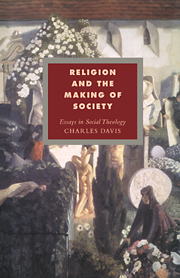Book contents
- Frontmatter
- Contents
- General editors' preface
- Acknowledgements
- Introduction: from the secular to the supernatural
- PART I Society, religion and human agency
- PART II Praxis, narrative and religious language
- PART III From the modern subject to the postmodern self
- PART IV The option for the future
- Index
- Cambridge Studies In Ideology And Religion
Introduction: from the secular to the supernatural
Published online by Cambridge University Press: 18 December 2009
- Frontmatter
- Contents
- General editors' preface
- Acknowledgements
- Introduction: from the secular to the supernatural
- PART I Society, religion and human agency
- PART II Praxis, narrative and religious language
- PART III From the modern subject to the postmodern self
- PART IV The option for the future
- Index
- Cambridge Studies In Ideology And Religion
Summary
The purpose of this book is to investigate the relation between religion and society. It begins by examining the thesis that society is the product of human agency. That thesis is characteristic of the modern period. Hence it immediately raises the question of the meaning of modernity and the function of religion within the modern context (Chapters 1–4). The linguistic and pragmatic orientations of both modern philosophy and social theory lead to a discussion of narrative and social practice as vehicles of meaning (Chapters 5–7). The question whether modernity is an incomplete project, as Jürgen Habermas would have it, or a mistaken universalism, as the post-moderns maintain, is debated under the heading of our identity, both individual and collective, and in an examination of the formation of the modern self (Chapters 8–9). The practical relevance of the theoretical analyses comes to the fore in a critique of Michael Novak's suggestion that we make ‘democratic capitalism’ our ideal, and in an original attempt to define religious hope and its grounding in terms of communicative rationality (Chapters 10–11).
This introduction has a threefold function. First, to introduce the themes developed in the sequence of chapters. Second, to supplement the discussion as found in the chapters by bringing into the discussion some very recent material, particularly the work of John Milbank and his surprising use of the Catholic philosopher, Maurice Blondel. Third, to outline the general context within which all the particular discussions take place, namely, a shift in theology from a focus upon the secular and the theology of secularization to a focus upon the supernatural and the theology of grace or of supernatural liberation.
- Type
- Chapter
- Information
- Religion and the Making of SocietyEssays in Social Theology, pp. 1 - 18Publisher: Cambridge University PressPrint publication year: 1993



